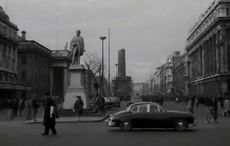From his earliest offerings to the masterworks that made his reputation, Brian Friel’s theatrical vision remained remarkably consistent. His theme was the fate of love, and from the beginning he understood that a remote Irish village was as good a place to explore it as anywhere.
“For me the true gift of theater, the real benediction of all art,” he wrote, “is the ringing bell which reverberates quietly and persistently in the head long after the curtain has come down and the audience has gone home.”
Few Irish playwrights have interrogated our past and our present with such a lighthouse intelligence, in the process transforming how we talk about both. Few Irish writers that have followed him dared to ask or answer the questions he put before us with his facility and dazzling frames of reference.
Afterplay, now showing at the Irish Repertory Theatre in New York, is a late in life offering from the Irish master that reminds us that his curiosity and courage never faltered, not even to the final curtain.
The play, which first premiered in Dublin in 2002, portrays a fictional meeting between two fictional characters from Chekhov (Sonya from Uncle Vanya and Andrey from Three Sisters) meeting up in Moscow in the 1920s.
Placing two characters from two frequently performed Russian masterworks onstage to reflect on their life trajectories after the plays that introduced us to them have ended is a remarkable way for Friel to pursue one of his own obsessive themes – the end of illusion and the road onward, once the tall tales we tell ourselves in order to live finally come to an end.
Afterplay, set in a sort of lamp lit tearoom, could just as easily have placed its two characters in an antechamber of hell. That’s because as the play progresses the audience discovers that for both Andrey and Sonya life’s road has already run out.
There are bright echoes of Samuel Beckett in Friel’s mordantly funny script and in Joe Dowling’s nimble direction. Andrey’s suit is threadbare, suggesting one of the tramps from Waiting for Godot. It becomes clear that the bright thing he lives for exists only in his imagination, and even there only as a dwindling memory.
Dermot Crowley is pitch perfect as the by turns proud and pretentious concert violinist. He begins by weaving tale after fantastical tale with himself as heroic protagonist, but as time passes it becomes increasingly clear that he’s hardly the dynamic figure he has painted himself to be.
As Sonya, the wistful -- and it emerges -- broken past repair figure from another play, Dearbhla Molloy is ideally cast and gives such authoratative line readings that she becomes the still center of the show, the eye of its storm.
It’s just two people meeting in a tea room but nothing less is at stake than their happiness, their sense of themselves, their past and what’s left of their futures.
First Friel beguiles us with his what-if premise, and then he pulls the rug and reminds us that the central conflicts in this drama have the power to make or unmake a life in an afternoon.
Although the revolution has occurred and the world that they once knew is now as lost as Atlantis, Sonya and Andrey barely mention the new Russia. Friel clearly isn’t interested in the political context, and so he mirrors the comic self-absorption that Chekhovian has previously mined.
For example, Andrey moans about the pointlessness of a life lived “in a waiting room,” and all the while he’s more or less seated in one.
But it’s Molloy as Sonya who astounds with a riveting and revelatory near aria that concludes with her prediction that the rest of her life will be lives “in a tundra of loneliness.”
Both have gambled their hearts and lost. Friel doesn’t make it any easier on them, but nor does he belabor their fates.
We will all share them, Afterplay suggests, in one way or another, sooner or later. No one can out run life’s great reckonings. The courageous thing to do is not deny it, nor try to escape, Sonya reminds us, since escape is impossible anyway.
It’s clear by the play’s end that Andrey and Sonya might have made great companions and possibly even life partners had they met earlier. But the past is the past and cannot be changed, and what’s gone is past help.
The final irony in this absorbing play is that the illusions that help us live can also prevent us from doing so.
(Afterplay is playing at the Irish Repertory Theatre, 132 West 22nd Street, until November 6. Visit www.irsihrep.org for tickets and showtimes.)




Comments